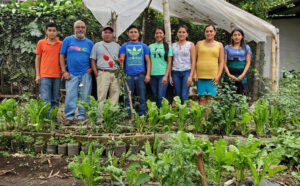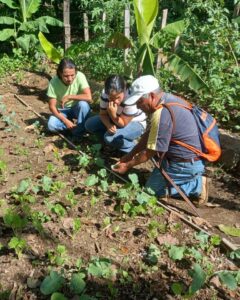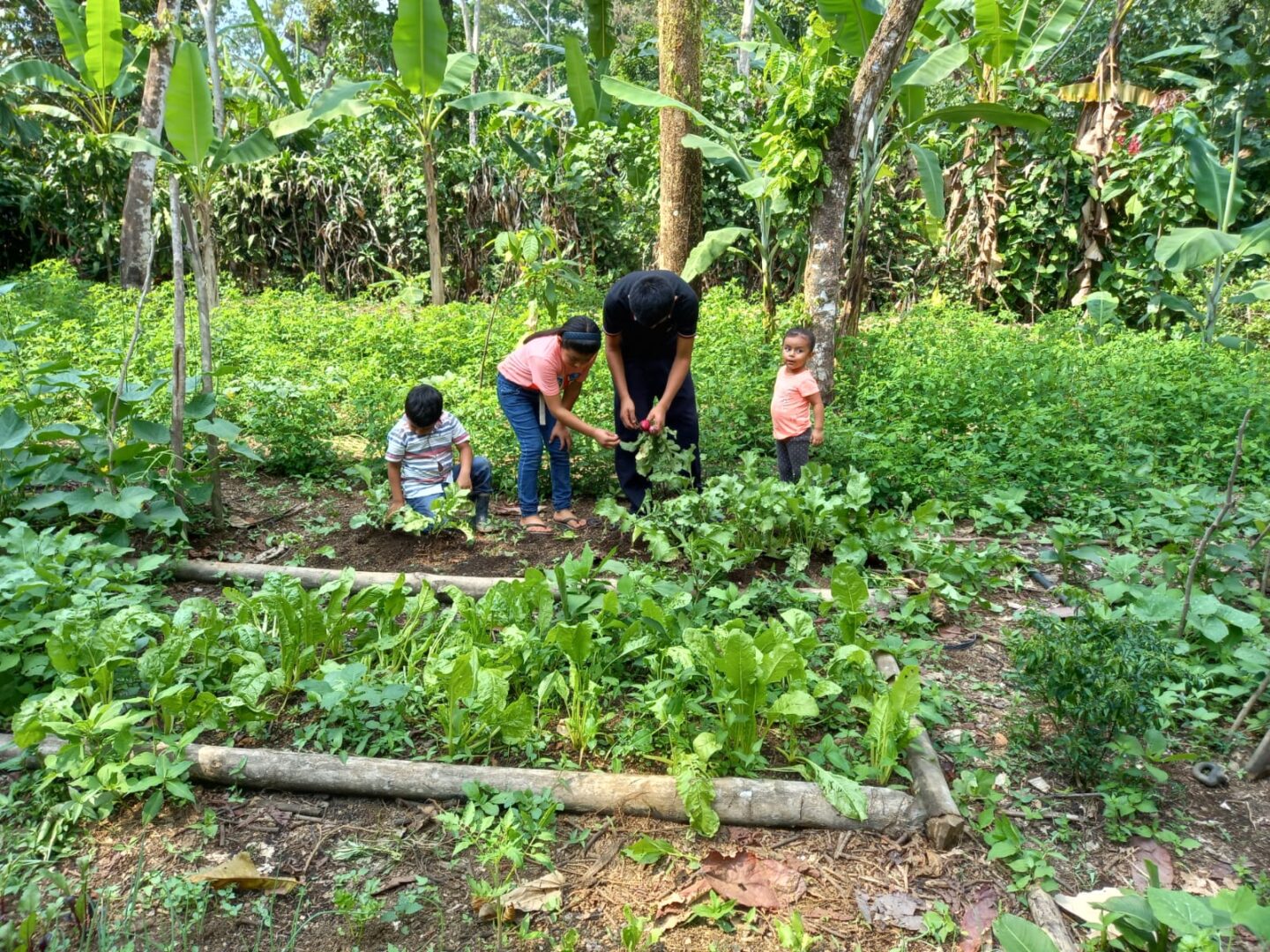Fostering healthy lives and self-reliance in rural Guatemala: Q&A with Seeds for a Future
Written by Olivia Nater | Published: April 10, 2023
Through our Global Partners program, Population Connection supports a growing number of grassroots organizations around the world working to increase access to education, public health and family planning services. Their efforts make a vital difference in their local communities and represent the “final step” in our shared work to make the world a more just and sustainable place for everyone.
Get to know our wonderful partners in this Q&A series! In this post, Suzanne de Berge, President of Seeds for a Future, tells us about her organization’s work to foster community development in rural Guatemala that integrates permaculture, nutrition education, and micro-business opportunities.
What prompted you to start your organization?

After working as archeology volunteers in the Chocolá area (Suchitepequez, Guatemala) in 2004, we wanted to try to help the people of the area with whom we had worked on the project. As is typical in most of rural Guatemala, government services are minimal, malnutrition is very high, food security is often marginal, and poverty is widespread. We held a community meeting to ask residents what they needed most. While responses were most frequently “money” or “jobs,” it was clear these could be generalized to the fundamental underlying need “to take better care of our families and create a better future for them.” Seeds for a Future was launched in 2007, initially focusing on cacao as a more profitable crop, and tourism as a new income source. This focus was soon modified toward achieving more immediate results via training in home gardens and the nutrition and health needs of rural families. The new focus also works to build self-reliance while broadening the role of women to become more involved as decision-makers for their families and leaders in their communities.
What programs or projects are you currently working on?
Encouraged by the determination of the local community, we developed a flexible, integrated program of nutrition and health, permaculture gardens, and microbusiness support. Our concepts and methods have been tested and refined over more than fourteen years of direct work with rural families. The fundamental goal of this program is to help families build better, healthier lives via improved nutrition and food security, and better household health and income. Where once there was little to no opportunity and poor health, over 2,200 families and 14 communities now enjoy healthier lives and greater financial independence. A randomized 30-month controlled trial conducted by the Instituto de Nutrición de Centro América y Panama (INCAP) and reported in 2018 clearly demonstrated the effectiveness of Seeds for a Future’s concepts and methods in producing substantial improvement in maternal and infant malnutrition.
Tailored to the resources and abilities of each family, our 12-month program includes:
- Our flagship “Casa Granja,” or Backyard Farm Program, with permaculture nutrition gardens and small animal protein sources. Our team of well-trained local extensionists supplies rural families with the necessary information, mentoring, and start-up materials to develop sustainable nutrition gardens and small animal protein sources.
- Nutrition and family health education for mothers, infants and children, with a significant focus on the first 1,000 days of an infant’s life.
- Micro-business mentoring, as applicable.
- Additional topics covered such as hygiene and sanitation, family first aid, gender equity, and other related topics.
- Knowledge sharing is provided via coaching and mentoring in weekly one-on-one household visits and periodic group learning sessions, including cooking demonstrations.

While these components work directly toward the goal of better lives, when participant families put them into practice at their homes, they also learn experimentation, investigation, decision- making, and self-reliance. Individuals and families build vital self-confidence and a sense of community. Our commitment to mutual respect, one-on-one mentoring and knowledge sharing has produced a sustainable and replicable approach to the long-standing problems of nutrition, food security, and poverty.
What do you hope to achieve in the next five years?
An important measure of our program’s success is that families seek us out, asking to participate, because of what they have seen and heard from their neighbors.
Our immediate goal is to at least double the number of extensionists in our core area, allowing us to significantly increase the number of families we can help achieve better nutrition and self- reliance.
To expand our reach into more distant and diverse areas, we created a 7-month extension model. In recent years we have substantiated the flexibility and success of using the extension model of the Casa Granja Program in five diverse locales. The extension program trains new extensionists in each locale and at the same time a group of local families starts their training for nutrition gardens and animal-raising. These families and new extensionists then carry our concepts and methods forward in their own communities, while we offer on-going consulting support as needed.
The mid-term goal is to secure funding for and complete at least one new extension project per year for the next five years. while continuing to increase the number of families being served in our core area. These new extension projects will be selected based on community needs and interests, and diversity of agricultural and cultural environments.
Our long-term objective is to develop a partnership that will lead to the implementation of a national program. This objective will include a learning center to train extensionists and community leaders, not only in the concepts and methods of this program, but in the leadership and mentoring skills required to ensure each family’s success.
What have been some of the greatest challenges you have faced?
Someone once said to us, “If you can succeed in Chocolá, you can succeed anywhere.” They were referring to the impact of 30+ years of civil war, countless years of patronism and ineffective government and institutions at many levels. These impacts fostered suspicion and distrust, expectation of handouts, limited or no sense of community or shared paths to success, and a lack of confidence in their abilities and decision-making.
The key to our success and staying power is working with respect and an ethic of shared learning, with no political or religious agenda, and with strict adherence to the overriding goal of bettering lives.
Not all areas of Guatemala were as affected by the factors noted in Chocolá, but starting our work there prepared us for challenges in other communities and areas.
Of course, there are always challenges when working with the natural environment and human nature. And there is the ever-present challenge of fundraising, which is particularly difficult for a small independent organization.
What are you most proud of?

We are very proud of our Program Manager and team of Extensionists for their commitment to helping families and communities thrive and grow, and the leadership they embody in that process.
The adaptability of the Casa Granja model is also a source of pride. More than a decade of design and fine-tuning, with input from participating families, has resulted in environmentally sound nutritional solutions for families of all sizes, with all levels of resources. Careful tracking of results within the context of environmental and cultural change allows the team to continuously design for future resilience.
It’s gratifying that we do not need to recruit or convince participants — families come to us and ask to participate in our program. We are pleased to work with anyone who demonstrates the desire to grow and learn.
We are proud of the program’s sustainability; families continue to use what they learn through our coaching and mentoring, creating better lives for their families far into the future.
In addition to better nutrition, food security and family income, it is wonderful to see participants develop confidence in their abilities and decisions. This sense of agency fosters a general sense of self-worth and is vital to the sustainability of our program’s impact. As families share what they have learned and produced with friends and neighbors, health and wellness levels rise, in their neighborhoods and communities.
Anything else you’d like to share with Population Connection members?
One of Seeds for a Future’s fundamental methods that contributes greatly to our program’s success is the engagement of women in a role that is culturally acceptable, while also helping them develop agency and strength. When participating women see they are capable contributors to family health, well-being and finances, they are empowered in new ways and make new decisions.
As children and other family members experience better nutrition and health, families, and especially women, make new decisions about education, employment, microbusinesses, and even family planning.
To learn more about Seeds for a Future, visit their website and follow them on Facebook!

